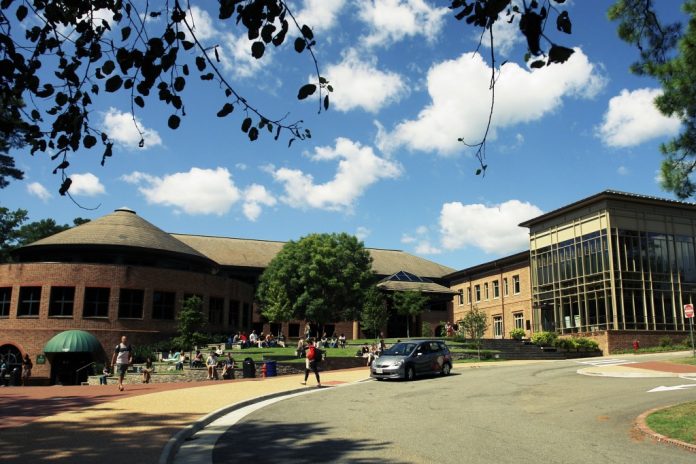Wednesday, Feb. 5, students at the College of William and Mary gathered on the Sadler Terrace to protest recent actions taken by the Indian government. They stood in solidarity through windy and rainy conditions with similar protests being held across India.
The event was organized by W&M Students United, the Asian American Student Initiative and the South Asian Student Association. According to the event’s public Facebook page, protesters were specifically targeting three recent acts of legislation passed by the Indian Prime Minister Narendra Modi’s government — namely the Citizenship Amendment Act, the National Registry of Citizens and the National Population Register — as well as state-sponsored terror campaigns on Indian college campuses.
Atitya ’20, who chose not to provide their last name for privacy reasons, was one of the members of W&M Students United who joined the protest. Atitya elaborated on how the CAA, NRC and NPR specifically target Muslim citizens of India. Atitya said the new laws are a result of Hindutva, or Hindu nationalism, and that they place significant barriers to Indian citizenship for Muslim refugees, including Ahmadiyya Muslims fleeing persecution in Pakistan and Rohingya Muslims fleeing Bangladesh and Myanmar.
“Basically, it’s a step towards making India a Hindu state,” Atitya said.
AASI Director Athena Benton ’21 elaborated upon the protesters’ issues with the Indian government’s policies and illustrated why students had come out to express their dissatisfaction with the legislation.
“The legislation is Islamophobic and gives opportunity to be further interpreted as anti-indigenous, anti-poor, and casteist,” Benton said in a written statement.
“The legislation is Islamophobic and gives opportunity to be further interpreted as anti-indigenous, anti-poor, and casteist,” Benton said in a written statement.
Atitya also explained the violence occurring on Indian college campuses.
“On Dec. 15 in particular, hundreds of police officers entered two university campuses, primarily Muslim universities, and attacked students,” Attiya said. “They beat students with sticks and tear gassed students in the library.”
Patton Burchett is an assistant professor in the College’s religious studies department whose research focuses on South Asian religions and Hindu-Muslim relations. This semester, he is teaching a course on modern Hinduism, which explores many of the issues that the protesters highlighted. Burchett said that tensions between Hindus and Muslims on the Indian subcontinent can be traced back to the early thirteenth century when Persian culture started mixing with Brahminical culture and brought Islam with it. From around 1200 CE to 1700 CE, a Hindu religious identity gradually started forming in opposition to the already existing Muslim identity.
“Prior to that, there were Vaishnavas and Shaivas and Shaktas, but they would’ve largely thought of themselves as separate religious groups,” Burchett said. “But over time they see everything they have in common when contrasted with a Muslim ‘other.’”
Burchett also said that 18th century British colonialism worsened Hindu-Muslim relations on the Indian subcontinent.
“Colonialism had a big part to play in exacerbating the tensions that were already there and making these groups see each other in starkly opposed antagonistic terms,” Burchett said.
“Colonialism had a big part to play in exacerbating the tensions that were already there and making these groups see each other in starkly opposed antagonistic terms,” Burchett said.
He explained that the British enacted multiple policies that pitted Hindus and Muslims against each other, including the introduction of separate Hindu and Muslim electorates, the generation of separate family law systems for each group and the forced identification of Indians to describe themselves as either Muslim or Hindu in the national census.
Burchett said that it was in this context — in 1920s colonial India — that the Hindu nationalism described by Atitya arose. Hindu nationalism spread across the subcontinent and began gaining political power in the 1980s through groups like the right-wing Bharatiya Janata Party. The BJP is the party currently in power in India, and is responsible for passing the CAA, NRC and NPR under Modi’s leadership.
Atitya said that students were also protesting the role of the United States in worsening Islamophobia in India.
“Islamophobia would not be of this degree in the world were it not for America’s propaganda in the world and America’s narrative regarding Muslims,” Atitya said. “The American narrative is strong in India, so these struggles are intimately related.”
Burchett agreed that there are very strong connections between some troubling political and social trends in the United States and India today, and added that he hopes to one day teach a course on the similarities between white nationalism and Hindu nationalism.
“Trumpian white nationalism is very parallel to Modi’s Hindu nationalism,” Burchett said. “There’s so many connections there that I really want to do that at some point.”
The three groups organizing the protest are known for their intersectional social justice activism on campus; W&M Students United organized a campaign against prison labor during the 2018-2019 academic year, which involved a public hunger strike. According to Jehan Narielvala ’21, a member of the SASA, the organization will hold events this semester to raise money for the Indian nonprofit organization Doctors For You. Benton said that the goal of the AASI is to provide a safe space for students to discuss issues pertaining to the Asian-American community.
Ultimately, Attiya said that the most important objective of this protest was to show that students at the College stand in solidarity with those suffering under Modi’s government.
“Students are being attacked in India and so we are here in solidarity with them,” Atitya said.
Narielvala shared a similar sentiment.
“My anti-CAA-NRC-NPR stance represents my solidarity with the Indian university students attacked by the police and the millions of Muslims that have been betrayed by their country,” Narielvala said.
“My anti-CAA-NRC-NPR stance represents my solidarity with the Indian university students attacked by the police and the millions of Muslims that have been betrayed by their country,” Narielvala said.

